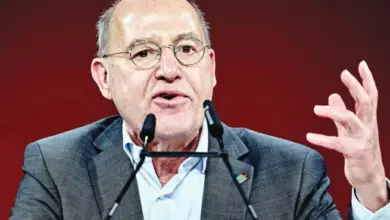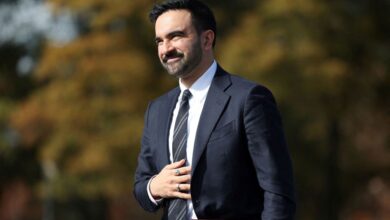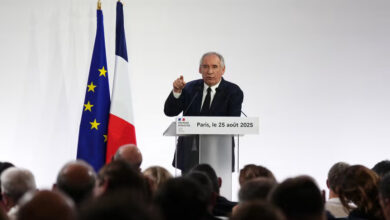Since 2004, the Ministry of Religious Endowments has been talking of plans to unify the call to prayer among Cairo's some 4,000 mosques. This year, Minister Mahmoud Hamdy Zaqzouq declared that this plan would be enforced at the beginning of Ramadan in order to limit the "war of the microphones.”
Egypt would be following in the footsteps of Syria, Turkey, and the UAE, all countries which have successfully unified calls to prayer.
So far only about 50 of the city’s mosques have been equipped with the receiver devices needed to broadcast the unified call to prayer, while none of the countless zawyas (little mosques, literally “corners”) have been equipped.
Despite initial media reports that the non-unified calls to prayer were going to be officially phased out, the opposite seems to be true.
The azan, or call to prayer, is broadcast five times a day, typically via loudspeakers or megaphones; each azan is followed by a shorter call known as iqama – when worshippers actually congregate at the mosque.
Sheikh Mustafa Bakr, an official from the Ministry of Religious Endowments in Nasr City, told Al-Masry Al-Youm that, "only 40 mosques of a total of 107 in Nasr City have had their calls to prayer unified since the beginning of Ramadan.” Zawyas, according to Bakr, are still not accounted for in the Ministry’s plan.
Although he did not have information as to the exact location of these mosques and zawyas, Bakr added that "all the mosques which have been equipped with transmission devices so far are affiliated with the [Ministry of] Religious Endowments."
In theory, the first phase of the unification plan would include Heliopolis and Nasr City, while the next phase would focus on the south of Greater Cairo, specifically al-Haram and the Giza Governorate.
According to the Ministry of Endowment’s projected plans, Egypt's mosques–including 100,000 outside of Cairo–would fall under the system by the end of the year.
There are some concerns that the government is interfering in the affairs of mosques across the country, especially in light of Zaqzouq's warnings last month that the utilization of mosques for political activities, such as electoral campaigning and protests or demonstrations, would be forbidden.
Opponents of governmental intervention in mosque affairs have also claimed that the Ministry of Religious Endowments and the Ministry of Interior intend to install CCTV cameras in mosques to monitor worshippers, sermons, and donations. The Ministry of Endowments has adamantly refuted these claims.
Salafists and other conservative Islamist groups have also objected to regulations imposed on mosques and zawyas by the government to appoint preachers.
Other regulations include those issued in 2002 by the Ministry of Religious Endowments, which stipulate conditions for the registration of mosques andzawyas, dictating that mosques must have an area of no less than 100 square meters, while zawyas cannot be smaller than 50 square meters.
Religious officials also dismissed reports that the government has been planning to regulate Friday sermons and unify their themes.
“These are baseless claims. The Ministry has no such plans," Bakr explained, stressing that the contents of Friday sermons, traditionally very political, will remain the exclusive domain of local preachers.
In Nasr City's Raba'a al-Adawiya Mosque, worshipper Ahmad Atris said that calls to prayer have not yet been unified in the 8th zone of Nasr City, where he lives.
“All six mosques around my home announce the azan at different times and pitches. The result is a cacophony of voices, some of which are very discordant," Atris said.
At the mosque, a turbaned and robed sheikh, Bassiouny Abdel Aziz, who serves as the muezin (prayer caller) at Raba'a al-Adawiya responded to Atris’s statement saying, "The call to prayer is supposed to be announced via an attractive voice so as to encourage the faithful to converge upon the mosque for prayer.”
Abdel Aziz added, "Unfortunately the timing of muezinin are off. One starts as the other is finishing, or is in the middle of his azan. Moreover, their voices are often off key. What we end up with is a lot of noise which may actually discourage the faithful from their prayers."
The muezin told Al-Masry Al-Youm that his mosque, one of the largest in Nasr City, has purchased and installed the Ministry of Endowment's transmission device. He added that he knew of only two other (relatively large) mosques around Raba'a al-Adawiya that have installed these devices. The devices, said to cost LE170, broadcast a live transmission of a qualified muezin conducting the call to prayer.
Abdel Aziz went on to say that neither he, nor any other muezin that he knew of, was resisting plans for a unified call to prayer.
"We don't perceive the unified call to prayer as a threat to our services. After all, it is only the azan that is unified. As for the iqama, it is still the local muezin who announces it.”
Residents of Nasr City told Al-Masry Al-Youm that calls to prayer had yet to be unified. While residents of Heliopolis, in neighborhoods including Masaken Sheraton, Hegaz Square, and Heliopolis Square, likewise said that calls to prayer had not been unified in their location.
One Heliopolis mosque, Al-Khulafaa' Al-Rashideen, a large mosque in the Merryland neighborhood, has installed a transmission device. However, residents say that technical problems have temporarily prevented the use of the transmission device.




